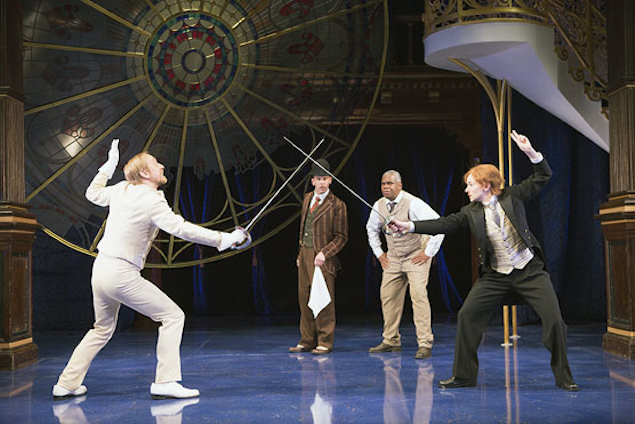
As the cultural zeitgeist dizzies its way round and round Baz Luhrmann’s
Gatsby adaptation like water circling a toilet bowl, it’s as good a time as any to ponder
historically creative stagings of Shakespeare plays. Luhrmann himself moved Verona
to SoCal in his 1996
Romeo + Juliet, while Orson Welles shifted
Macbeth all the way from dreary Scotland to tropical Haiti. At the Folger this month, Robert
Richmond sets his
Twelfth Night in
Downton-era 1915, imagining the sinking of the
Lusitania as the shipwreck that casts both Viola and Sebastian into Illyria.
It’s a gimmick that provides plenty of fodder for design elements but little for the
cast to work with, apart from inexplicable camera flashes and silent-film-inspired
chase scenes that end up recalling the canon of another incomparable Brit: Benny Hill.
Luckily, Richmond’s cast is stellar, from the glacial, elegant
Rachel Pickup as Olivia to the sunny, engaging
Emily Trask as Viola. The only off note is the seemingly miscast
Craig Wallace as Sir Toby Belch, who’s upstaged over and over again by
James Konicek’s exceptionally funny and sympathetic Sir Andrew Aguecheek, as well as
Louis Butelli’s surprisingly menacing Feste.
Twelfth Night is one of Shakespeare’s odder plays, structurally, with its subplot surrounding the
deception of Malvolio eclipsing the less interesting love triangle between Orsino
(a stately
Michael Brusasco), Viola/Cesario, and Olivia in terms of both time onstage and entertainment value.
Richmond wisely amps up the ridiculousness, making Malvolio (Richard Sheridan Willis) an absurdly dour prig with an ornate pompadour hairstyle. And yet Willis’s command
of the role is so entrancing that when Malvolio gets a whiff of social elevation,
his frosty veneer believably falls apart in an instant. It’s enough to make you wish
this much-maligned manservant got the attention he deserved—or at least a sitcom.
Tonya Beckman is cheerily tricky as Maria, and her role in the ill-fated letter precipitates a
very dark turn of events whereby Malvolio is imprisoned in a surprisingly flexible
piece of scenery (no good can come of crossed garters, ever). The shift in mood is
echoed in the relationship between Sebastian (William Vaughn, looking a lot like Prince Harry) and Antonio (Chris Genebach). The homoerotic subtext in the relationship between the two is impossible to ignore,
and so Richmond puts it center stage, making Antonio clearly besotted with the young
man, and echoing a moment earlier when Orsino and Cesario (in drag) are but milliseconds
away from a clinch.
Tony Cisek’s set is typically elaborate, with a vast, circular stained-glass skylight (a remnant
from the shipwreck, presumably) rotting gently at the back of the stage. The Art Deco
design is lovely, but the size of the structure seems to render a large part of the
space off-limits. More useful is the piano downstage upon which Valentine (Joshua Morgan) plays soft piano classics such as Satie’s
Gymnopédie. Morgan’s presence is one of the play’s cleverest and most self-aware notes, setting
the mood effectively with a soundtrack ranging from Classic Lite to the frenzied scores
of silent caper movies whenever he’s beckoned by a cast member.
Mariah Hale has fun with the costumes, dressing Olivia in romantic florals (once her all-black
mourning period has been banished by Cesario) and giving Maria hot pink petticoats
to flash underneath her floor-length skirts. (I won’t spoil Malvolio’s makeover other
than to say it’s most buzzworthy.)
With so many strong performers and a number of original ideas, Richmond’s interpretation
is a crowd pleaser, and the musical scenes in which actors pick up different instruments
are touching, even if they frequently slow the pace to a too-languorous crawl. It’s
hard to say that the period setting adds anything new to such a familiar work, but
the cast’s supple comic timing and malevolent undertones make it a
Twelfth Night to ponder long after the lights go up.
Twelfth Night
is at the Folger Theatre through June 9. Running time is about two hours and 40 minutes,
including one intermission. Tickets ($30 to $68) are available at the Folger’s website.
















